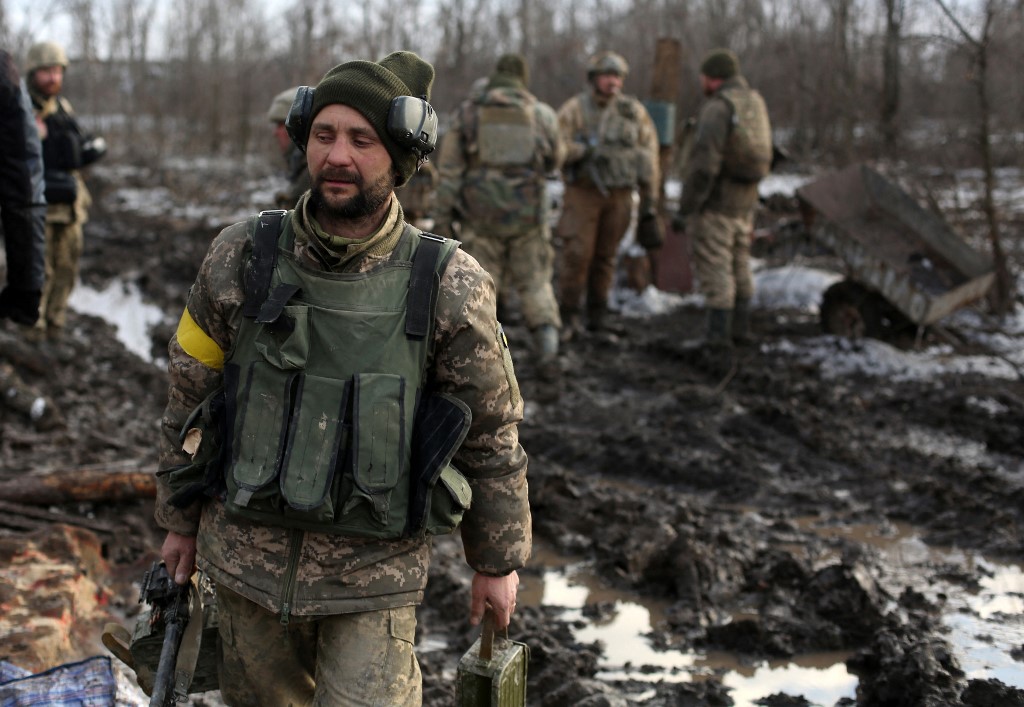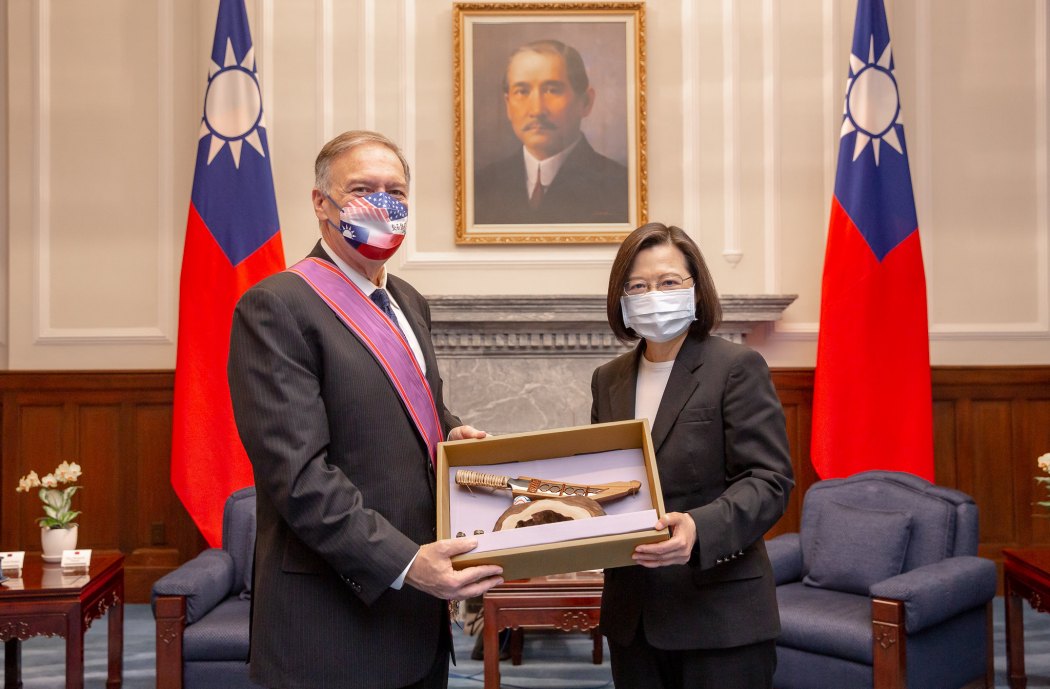Some people in Hong Kong might find the phrase “today’s Ukraine, tomorrow’s Taiwan” familiar. It was commonly repeated during the self-ruled island’s 2014 Sunflower Movement and in 2019, when Hong Kong saw months of protests and unrest, only with “Hong Kong” in place of “Ukraine.”
The phrase implied that what was happening to Hong Kong could eventually happen to Taiwan, too. It is understandable that the updated phrase has sprung up in Taiwan, where Ukraine’s predicament has led to a lot of animated discussion on whether it could happen on the island too.

Taiwan’s government has frowned upon this comparison. A cabinet spokesperson stated it was “inappropriate” to say “today’s Ukraine, tomorrow’s Taiwan” and accused people who had done so of “manipulating” the topic and affecting public morale.
This is a seriously misguided stance. If anything, the authorities should be encouraging more discussion among the public about such a relevant issue to Taiwan’s security.
Going beyond the obstruction of free speech aspect of a government telling people to stop discussing a vital topic, there is also a bit of hypocrisy given that Taiwan’s ruling DPP and President Tsai Ing-wen utilised the original version of that phrase widely during Tsai’s successful 2020 presidential election campaign.
While the situation in Hong Kong was a police crackdown on protests, the military conflict taking place in Ukraine is more likely for Taiwan, making the current phrase even more relevant than the original one.

Russia’s invasion of Ukraine has resulted in a strong focus on international affairs in Taiwan, which is rare. Since the invasion started on February 24, news headlines have been dominated by the invasion, and TV discussions and parliamentary sessions have been devoted to the ongoing conflict.
In comparison, the US withdrawal from Afghanistan last September hardly generated much attention in Taiwan.
Meanwhile, the distressing scenes from Ukraine of families sheltering in underground subway stations, armed civilians serving on the front line, and urban buildings obliterated by missiles are unnerving to people in Taiwan, because they show a glimpse of a frightening future that was previously thought unimaginable.
The media and general public in Taiwan are right to be concerned about the Ukraine invasion, given China’s claim to Taiwan, which does not exclude military conflict to bring about the result. To that end, China has ramped up its military spending and buildup, while also flying planes into Taiwan’s Air Defence Identification Zone – which is not its airspace – over the past year much more frequently than it used to.
That China’s military is much larger than Taiwan’s in terms of soldiers, planes, and ships is not a secret, though whether China can carry off an invasion attempt across the Taiwan Strait is another issue. An invasion is most likely not probable in the very near future, unlike with Russia, which had been amassing its forces along Ukraine’s borders since last year.
Regardless of the possibility of an attack, Taiwan needs to take its national defence seriously.
The reality is Taiwan has significant problems, ranging from the state of the military to the extremely brief conscription term to the paucity of civil defence programs. None of these problems are recent, having existed for many years and openly discussed and criticised by many international and local observers.
At only four months long, conscription seriously lags behind South Korea and Singapore, which both have programmes that are at least 18 months long, and has been derided for being useless, while air force planes still fall from the sky and crash, killing pilots. The reservist program is undergoing a needed revamp to lengthen its duration and improve training, which has just begun on a trial basis that will involve 15,000 reservists this year.

The authorities have instead put a lot of hope in US protection and intervention during war. This optimism about US military support has rubbed off on the Taiwanese public, with recent polls showing that as much as 60 percent of respondents believe the US will support Taiwan if war happens.
Yet as the Afghanistan withdrawal and invasion of Ukraine show, US intervention is not guaranteed, nor – if it happens – guarantees victory. The state of the world is becoming more precarious and as surprising as Russia’s invasion was, it is only the latest in several devastating military conflicts including Yemen, Ethiopia, and Afghanistan.
Taiwan’s authorities are failing to truly prepare the public for potential conflict, both psychologically and pragmatically. As news clips and images from urban battles in Ukraine show, civilians have not only been heavily affected but are also playing a major role in defence efforts. Given that Taiwan is an island and that its major cities lie along its western coast, any attack would impact civilians.
A few local private groups and individuals have taken it on themselves to conduct workshops on civil defence, instructing participants on first aid and other emergency response measures. The government should ideally be supporting these efforts, if not organising them, as well as publicising information on air raid shelters and evacuation routes in cities.
The authorities are working on a handbook for the public, but this is long overdue especially when considering that countries like Sweden already did so for their citizens back in 2018.
Meanwhile, Tsai or the defence minister should consider speaking directly to the public rather than just mouthing platitudes. Tsai spoke to CNN last year where she specifically mentioned the China threat, but has not done a real interview with local Taiwanese media in at least two years.
The reform of the reservist program is decent but more is needed. The Ukraine conflict is a jolt that provides a much needed reality check for Taiwan, and rather than stifling debate, the government should accept the opportunity to be more forthright to the public about Taiwan’s security and national defence.
Support HKFP | Policies & Ethics | Error/typo? | Contact Us | Newsletter | Transparency & Annual Report | Apps
| HKFP is an impartial platform & does not necessarily share the views of opinion writers or advertisers. HKFP presents a diversity of views & regularly invites figures across the political spectrum to write for us. Press freedom is guaranteed under the Basic Law, security law, Bill of Rights and Chinese constitution. Opinion pieces aim to point out errors or defects in the government, law or policies, or aim to suggest ideas or alterations via legal means without an intention of hatred, discontent or hostility against the authorities or other communities. |
Help safeguard press freedom & keep HKFP free for all readers by supporting our team

More HKFP OPINION:
HKFP has an impartial stance, transparent funding, and balanced coverage guided by an Ethics Code and Corrections Policy.
Support press freedom & help us surpass 1,000 monthly Patrons: 100% independent, governed by an ethics code & not-for-profit.










